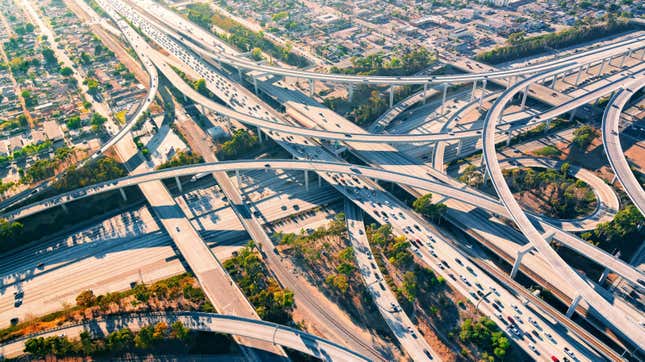
The federal government on Thursday announced a program targeted at undoing the racist road and highway development of past decades. The Department of Transportation established a $1 billion grant fund called “Reconnecting Communities” as a pilot initiative. The money is set to be distributed over the course of five years, with $195 million made directly available to grant applicants in 2022.
“Transportation can connect us to jobs, services, and loved ones, but we‘ve also seen countless cases around the country where a piece of infrastructure cuts off a neighborhood or a community because of how it was built,” said Transportation Secretary Pete Buttigieg in a press statement. “Using funds from President Biden’s Bipartisan Infrastructure Law, we are proud to announce the launch of Reconnecting Communities: the first-ever dedicated federal initiative to unify neighborhoods living with the impacts of past infrastructure choices that divided them.”
Under the grant program, states, local and tribal governments, nonprofits, city planning groups, and transit facilities can apply for money to try to remedy some of the injustices brought on by discriminatory transportation development. The first round of pilot applications will be accepted through October 13. Eligible proposals could include efforts like shoring up pedestrian and public transit pathways connecting neighborhoods cut-off by existing roads or demolishing sections of disruptive freeway entirely.
In addition to the Reconnecting Communities pilot program, the Department of Transportation press release also announced “Thriving Communities,” an initiative meant to provide technical support for “disadvantaged communities.”
What’s the problem with our roads?
All over the country, there are neighborhoods made into islands by massive highway networks. There’s also the conspicuous absence of the neighborhoods that once occupied the land now used for highways. Following the Federal Aid Highway Act of 1956, federal, state, and local leaders decided to bulldoze homes and businesses to make way for the multi-lane car future. And they were intentional (read: racist) about how they did it.
Many of the areas targeted for urban road expansion and freeway construction were home to recent immigrants or relatively low-income people at the time of construction. A report from Gothamist described what happened in New York City: The infamous Robert Moses (an appointed, never-elected official) planned the Cross-Bronx expressway to cut through working-class Jewish neighborhoods.
Those who could afford to leave as their community was cut up did, and the population that remained was even poorer and now lived near extra pollution, noise, and unsafe or non-existent routes to other neighborhoods. Then, new waves of marginalized people filled in the gaps. Black Americans moving north during the Great Migration and Puerto Ricans were excluded from many other parts of the city via redlining, and homes near the highway were more affordable.
On top of huge roads making travel out of and between neighborhoods more difficult, freeways hurt peoples’ quality of life and health. Freeways are ugly. Noise from traffic can harm children’s cognitive development. And the South Bronx (where Moses’ expressway sits) has one of the highest rates of asthma in the country. Researchers have linked that disease to air pollution from cars.
Moses orchestrated a similar plan with the Brooklyn-Queens Expressway. The BQE cut off working-class South Brooklyn (now Red Hook) from wealthier nearby neighborhoods. And these same stories repeat across the country. In Los Angeles, city leaders enacted similar focused development. In Syracuse, the construction of Highway 80 leveled a thriving Black community.
Addressing and fixing these past wrongs is a noble goal, but the Reconnecting Communities budget might not be enough to do it all. Initially, Biden had pledged $20 billion toward urban reconnection projects, much more than the $1 billion announced today.